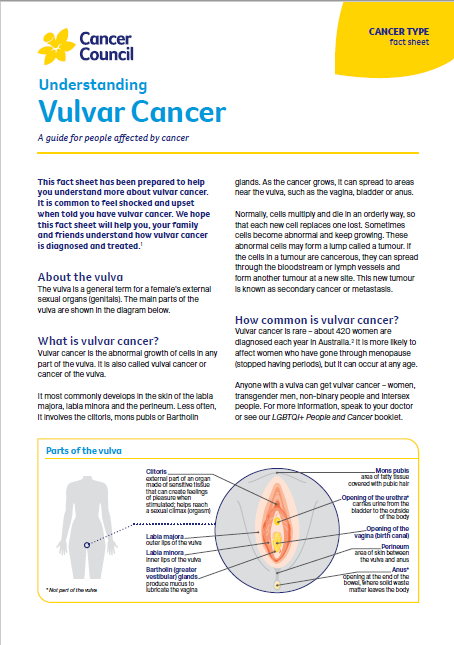- Home
- Vulvar cancer
- Symptoms
Vulvar cancer symptoms
Early vulvar cancer often has no obvious symptoms. It is commonly diagnosed after having vulvar symptoms for months or years.
These may include:
- an ulcer that won’t heal
- a lump, sore, swelling or wart-like growth
- itching, burning and soreness or pain in the vulva
- thickened, raised skin patches (may be red, white or dark brown)
- a mole on the vulva that changes shape or colour
- blood, pus or other discharge coming from an area of skin or a sore spot in the vulva (not related to your menstrual period)
- hard or swollen lymph nodes in the groin area.
Many women don’t look at their vulva, so they don’t know what is normal for them. The vulva can be difficult to see without a mirror, and you may feel uncomfortable examining your genitals. If you feel any pain in your genital area or notice any of these symptoms, visit your general practitioner (GP) so they can examine the area you are concerned about. Don’t let embarrassment stop you getting checked.
→ READ MORE: Vulvar cancer diagnosis
More resources
Prof Alison Brand AM, Director, Gynaecological Oncology, Westmead Hospital, NSW; Kim Hobbs, Clinical Specialist Social Worker, Gynaecological Cancer, Westmead Hospital, NSW; Dr Ming-Yin Lin, Radiation Oncologist, Peter MacCallum Cancer Centre, VIC; Dr Lisa Mackenzie, Clinical Psychologist Registrar, HNE Centre for Gynaecological Cancer, Hunter New England Local Health District, NSW; Anne Mellon, CNC – Gynaecological Oncology, HNE Centre for Gynaecological Cancer, Hunter New England Local Health District, NSW; A/Prof Tarek Meniawy, Medical Oncologist, Sir Charles Gairdner Hospital and The University of Western Australia, WA; Dr Archana Rao, Gynaecological Oncologist, Senior Staff Specialist, Royal Brisbane and Women’s Hospital, QLD; Tara Redemski, Senior Physiotherapist – Cancer and Blood Disorders, Gold Coast University Hospital, QLD; Anita Tyrrell, Consumer; Maria Veale, 13 11 20 Consultant, Cancer Council QLD.
View the Cancer Council NSW editorial policy.
View all publications or call 13 11 20 for free printed copies.
Need to talk?
Support services
Coping with cancer?
Speak to a health professional or to someone who has been there, or find a support group or forum
Looking for transport, accommodation or home help?
Practical advice and support during and after treatment
Cancer information
Dealing with the diagnosis
Common reactions to a cancer diagnosis and how to find hope
Resource hub
Guides, fact sheets, videos, podcasts and more for people with cancer, their families and friends

